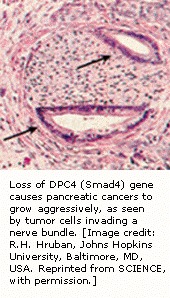NCBI Bookshelf. A service of the National Library of Medicine, National Institutes of Health.
National Center for Biotechnology Information (US). Genes and Disease [Internet]. Bethesda (MD): National Center for Biotechnology Information (US); 1998-.

The pancreas is responsible for producing the hormone insulin, along with other substances. It also plays a key role in the digestion of protein. There were an estimated 27,000 new cases of pancreatic cancer in the US in 1997, with 28,100 deaths from the disease.
About 90% of human pancreatic carcinomas show a loss of part of chromosome 18. In 1996, a possible tumor suppressor gene, DPC4 (Smad4), was discovered from the section that is lost in pancreatic cancer, so may play a role in pancreatic cancer. There is a whole family of Smad proteins in vertebrates, all involved in signal transduction of transforming growth factor β (TGFβ) related pathways. Other tumor suppressor genes include p53 and Rb, which, if mutated or absent from the genome can contribute to cancerous growth in a variety of tissues.
DPC4 (Smad4) homologs exist in the worm (Caenorhabditis elegans), mouse and the fly (Drosophila). In Drosophila, when the gene is not present, there a number of developmental defects. Likewise, homozygous Smad4 mutant mouse embryos die before embryonic day 7.5, and have reduced size because of reduced cell proliferation. Research on these model organisms should help elucidate the role of Smad4 and related proteins in humans.